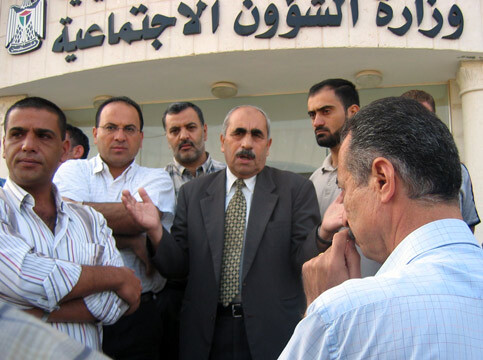The Electronic Intifada 2 October 2006

Protests have erupated throughout the West Bank and Gaza as thousands of Palestinian Authority employees have not received wages for months (Rima Merriman)
The paralysis of the present Palestinian Authority has simply highlighted to the world and to the Palestinians themselves, who are persistently in denial about this, the real Wizard-of-Oz nature of their Authority and public institutions.
For over a decade now, since the Oslo Agreement signed by the Palestinian Liberation Organization in 1993, the Palestinians, along with much of the world, have been laboring under a couple of misapprehensions. One is that, with Oslo, Israel had at long last recognized their aspirations, even if only partially. The other is that their leaders, as embodied by the presidency and the government that arose, had the wherewithal to move them towards a full-fledged Palestinian state on the 1967 borders in the face of Israel’s grand plans and intentions in the region. It’s the classic syndrome of desperate people believing what they want to believe.
The Palestinians and the international community then proceeded to be hoodwinked by the trappings they erected — some of which, like the government buildings in Ramallah, looked solid and well-furnished enough thanks to foreign aid. But a few days ago, the government seat, a gleaming white stone building, was burnt down and looted by the Palestinians themselves, who have been reduced to worrying not about a state, but about feeding their children.
The media is interpreting this act of vandalism as the result of the divisiveness between Hamas and Fateh, but in reality, it is the inevitable result of the political and economic architecture that Israel had the upper hand in constructing with the Palestinians since Oslo and that the US has been consolidating and tightening, as in a noose, rather than honestly brokering peace.
The powers of the Wizard of Oz, in the well-known American novel by that name, are revealed at the end to be special effects. In spite of the Wizard’s connection with the Good Witch of the North, he turns out to be a wizened old man with neither the power nor skill to provide anyone with brains, courage or heart - let alone a munchkin state.

The Palestinian Minister of Social Affairs argues with angry employees (Rima Merriman)
The current paralysis of the Palestinian Authority highlights its true nature by showing up its special effects for what they are, a brave attempt at wishful thinking. I am referring to things like public institutions, passports, stamps, country internet domains and car plates; and to gestures like naming the occupied territories as the occupied “territory” to disguise the lack of geographic contiguity between the Gaza Strip and the West Bank; like adding the word “National” to “Palestinian Authority”, to declare that the Palestinian Authority is the embryo of a future state, like proclaiming “the State of Palestine” on some government buildings and websites.
But the reality is that the Palestinian Authority’s elected officials at all levels can be kidnapped by Israel with impunity. The Palestinian authority lacks control, not only over external borders, but also over movement from one Palestinian city to another for itself and for its citizens. The Palestinian Authority has no sovereignty over its borders or over its population registry. It has no control over whether Israel can establish hundreds of Jewish settlements in its heart and expropriate Palestinian lands and exploit Palestinian resources.
The current paralysis of the Palestinian Authority also shows up the governance structure, as defined by Oslo to serve the security interests of Israel, to be itself a problem for Palestinians, and to be, in fact, the primary cause for the failures in PA governance to date - i.e., lack of democracy, rent-seeking and corruption.
The economic challenges facing the Palestinians after Oslo were enormous and were compounded by the fact that the occupied territories or the “quasi-state” constructed after Oslo had the economy of a developing country with all the challenges such an economy faces. The fiscal base of the Palestinian economy was dependant on income and customs taxes collected by Israel; its trade was dependent on Israel; the movement of goods and people were dependent on Israel, and Israel, naturally, took full advantage of these conditions to serve its interests, riding roughshod on Palestinian aspirations.

A poster pasted on the doors of the Ministry of Planning in Ramallah that reads “This is how the Palestinian government negotiates with its sons” (Rima Merriman)
What is remarkable, as economists point out, is that the advent of the PA did usher economic growth and private investment in spite of the uncertainties, and did reduce dependence on aid by approximately 10 percent of GDP.
However, just as the PA was building its administration, financed primarily by aid, Israel was building its illegal settlements, its checkpoints and its internal borders to protect its illegal settlements. Israel thus gained the ability to shut off entire Palestinian cities at very short notice, a power that it has used since the second Intifada to reduce the Palestinians to a basket case.
Now that the Palestinians have been sealed shut and starved, now that they are beginning to kill one another and to set fires in PA buildings, their representatives are readying themselves to speak with the enemy again on the enemy’s terms, as they did in Oslo. The chances for a better deal for them are slim, given that the rosiest scenario on the far horizon, the Road Map, replicates the Oslo formula.
What is to be done? That’s the million dollar question.
Related Links
Rima Merriman is a Palestinian-American living in Ramallah in the occupied West Bank.





